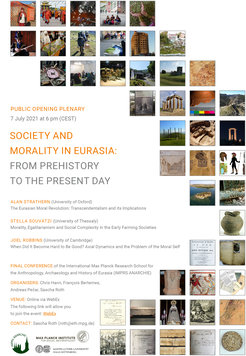The Development of Morality and Society in Eurasia
Moral rules and imperatives are of immense importance for our social coexistence. But how did they originate, what functions do they serve, and how have they changed over the course of human history? These questions are at the heart of the conference “Society and Morality in Eurasia: From Prehistory to the Present Day” organized by Chris Hann, Director of the Department ‘Resilience and Transformation in Eurasia’ at the Max Planck Institute for Social Anthropology (MPI) in cooperation with archaeologist Franҫois Bertemes and historian Andreas Pečar from Martin Luther University Halle-Wittenberg (MLU). The conference will be held online and take place on 7 to 9 July 2021.

Opening the conference on Wednesday, 7 July at 18:00, three internationally renowned scholars will deliver plenary lectures: historian Alan Strathern (University of Oxford) on “The Eurasian Moral Revolution: Transcendentalism and its Implications”, archaeologist Stella Souvatzi (University of Thessaly) on “Morality, Egalitarianism and Social Complexity in the Early Farming Societies”, and anthropologist Joel Robbins (University of Cambridge) on “When Did It Become Hard to Be Good? Axial Dynamics and the Problem of the Moral Self”. This transdisciplinary conversation will set the stage for the 7 panels and 18 papers in the subsequent days of the conference.
Moral Contexts: From Prehistoric Funerary Rites to Solidarność and Right-Wing Populism
The conference (which includes young researchers from adjacent social science disciplines) will cover a broad range of topics. Historical and archaeological perspectives include papers on moral and religious symbolism in the art and funerary rituals of the Palaeolithic; the connection between ideas of morality and kinship in ancient Mesopotamia; the celebrity of philanthropists in the Enlightenment era in the context of changing moral standards; and moral and social demands in periods of upheaval, such as the Russian Revolution of 1905 or the Solidarność movement in Poland in 1980-81. These studies are complemented by empirical investigations ranging from the right-wing rhetoric of the populist AfD party in Germany and its parallels with Nazi speeches in the 1920s and 30s; practices of moral self-identification of Romanian Roma in economic interactions with non-Roma; and the ethical dimensions of cooperation and resistance in the context of state, social, and religious border-making in the Kashmir region.
Morality and the “Other”
Across the diverse topics of the individual papers, the conference poses wider questions of universal relevance for how humans coexist within societies. When the norms about how to treat strangers differ from the treatment of those of our own society, how do we decide who is “us” and who is “other”? How are notions of “the good” communicated, transmitted, and experienced by individuals and communities in everyday life? How are these ideas reflected in political hierarchies and interethnic relations, in economic exchange and provisioning, in legal codes, and in reciprocal obligations of kinship and friendship?
ANARCHIE – Conclusion of the Doctoral Programme after 9 Years
The conference also serves as the culmination of the “International Max Planck Research School for the Anthropology, Archaeology and History of Eurasia” (IMPRS ANARCHIE), which began in 2012 as a cooperation between the MPI and MLU. The programme has provided excellent conditions for highly qualified young researchers to complete their dissertation in the frame of a structured graduate school. Its multidisciplinary organization enables rich theoretical and methodological cross-fertilization between the represented disciplines. By the conclusion of the programme, more than 35 young scholars will have successfully completed their doctoral degrees.
More information about the doctoral programme ANARCHIE: http://www.eth.mpg.de/2940538/anarchie
Contact for this press release
Sascha Roth
Max Planck Institute for Social Anthropology
Department 'Resilience and Transformation in Eurasia'
Advokatenweg 36, 06114 Halle (Saale)
Tel.: 0345 2927-377
Mail: roth@eth.mpg.de
http://www.eth.mpg.de/roth
PR contact
Stefan Schwendtner
Press and Public Relations
Max Planck Institute for Social Anthropology
Advokatenweg 36, 06114 Halle (Saale)
Tel.: 0345 2927-425
Mail: schwendtner@eth.mpg.de
http://www.eth.mpg.de
